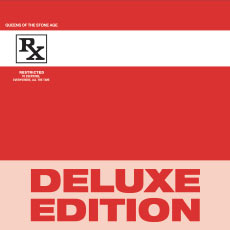The journey of Queens of the Stone Age began 27 years ago, though their mainstream success arrived with the releases of ...Like Clockwork in 2013 and Villains in 2017. However, the band’s success was built step by step, starting from their early days of garage-tinged stoner rock and gradually embracing pop sensibilities without abandoning their psychedelic roots or the signature solid guitars that define their sound.
Josh Homme’s hard-rock brutality has always come with humor and a dash of campy, scenery-chewing flamboyance. Not even a very messy, very public divorce battle can change that, as evidenced by “Emotion Sickness,” the first single from Queens of the Stone Age’s eighth album, In Times New Roman... The verses swing and rock like the band’s great “No One Knows,” while the creamy, classic-rock chorus could be lifted from Journey. “Baby don’t care for me,” Homme sings, turning a jazz standard on its head. “People come and go on the breeze/ For a whole life? Possibly.”
Borrowing its title from a line in “New Fang” (“Had it made to parade/ Found a sucker, now I want another”) by Them Crooked Vultures, Homme’s side project with Dave Grohl and John Paul Jones, “Made to Parade” sways low and wide like a big metal pendulum—then fires up a majestic, Brian May-esque bridge to the end. Homme, the last man standing from the original QOTSA lineup, invented his own very specific genre (including with his previous band Kyuss) in desert rock; sometimes metal, sometimes sludgy, sometimes psychedelic, sometimes bluesy, it has always allowed for flexibility.
So QOTSA goes goth-dark on “Carnavoyeur,” which works itself into a frenzy as Homme explores his lonesome-dove liberation: “Free fall from the nest, Then glide to the left/ A shine catch the eye, So flow to the right/ Flying high, realize, There are no more mountains to climb.” The band even plays with slinky, sexy New Romantic vibes on “Time & Place,” “What the Peephole Say,” and “Straight Jacket Fitting,” which sounds like said constraints should be paired with an ascot. Homme’s arch delivery sounds like Bryan Ferry fronting stoner rock; then the song ends ... and another fades in, all desert-mirage blurry like some kind of campfire Clapton number.
“Sicily” has a cool prey-stalking groove; “Paper Machete” slithers and grinds with its sleazy guitar solo. And “Negative Space” is a deliciously nasty piece of work, the guitar like a well-oiled monster hungrily sliding through the streets. “Don’t say you love me no more,” Homme half-pleads, half-commands.

In 2017, Homme enlisted producer Mark Ronson for the creation of Villains, which further pushed the boundaries of their sound. While it may have been more divisive, the album served as a testament to the band’s unwavering determination to innovate and evolve. With their latest album, In Times New Roman..., Queens of the Stone Age make a triumphant return. Raw, dark, and inspired, the record revitalizes the band’s direct rock’n’roll essence while maintaining their melodic prowess. It is a testament to their talent and an apt summary of their career, drawing inspiration from their discography without succumbing to self-parody.











